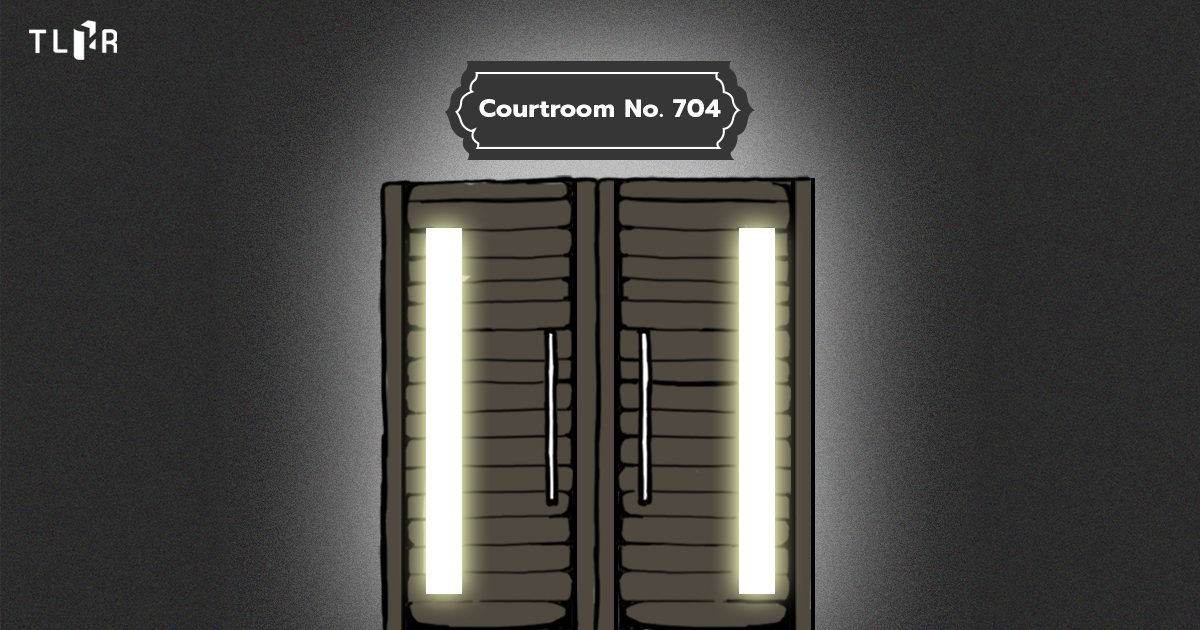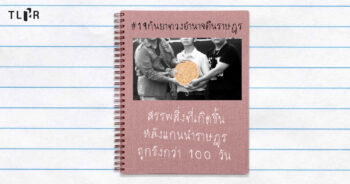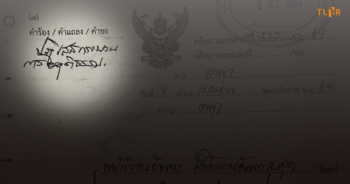On 22 April 2021, at 10:00 am, 21 lawyers from Thai Lawyers for Human Rights (TLHR) and its network filed a petition to the Chief Justice of the Criminal Court concerning the challenges and obstacles they have faced while providing legal assistance for political activists from the “Ratsadon” group. The petition is linked to the procedures of appearing before the Court and evidence examination for the lawsuit against Ratsadon activists leading the #19SeptemberReclaimThePowerToThePeople demonstration on 15 and 29 March and 7-8 April 2021.
The petition called for the Chief Justice to conduct an investigation and review of the Court’s measures to ensure that they are reasonable and adhere to general principles of standard criminal procedures. It asserted that the Court shall not devise special measures and discriminatorily apply them only for this case. Furthermore, the proceedings shall also uphold the open court principle and the fundamental rights guaranteed in a normal judicial process.
The lawyers have identified several obstacles that hindered the performance of their duties in guaranteeing the defendants’ rights and liberties, assisting the defendants in fully exercising the right to prove their innocence in Court, and enjoying the right to a fair trial. For instance, the bail requests from eight defendants had been denied repeatedly. Moreover, they have been subjected to unnecessary screening checkpoints, excessive control by prison and court officials, and contempt of court charges. Their lawyers were not authorized to have confidential conversations with them and had their phones confiscated during trials.
The petition, moreover, specified that a representative of the 21 lawyers had previously informed the Secretary of the Criminal Court about these issues, on 7 April 2021. However, although the Secretary had committed to seeking solutions, no concrete steps were taken to address such problems. Eventually, on 8 April 2021, Mr. Parit “Penguin” Chiwarak (Defendant No. 1), Mr. Anon Nampa (Defendant No. 2), Ms. Panusaya Sithijirawattanakul (Defendant No. 5), together with 18 other defendants in the same case, filed a petition against the unfair conditions that they experienced in the judiciary process and requested to release their lawyers requested from their duties.
Meanwhile, Ms. Sirikan “June” Charoensiri, one of the attorneys in this case, also submitted her own separate complaint letter to demand the Chief Justice to investigate and review the Court’s measures in guaranteeing the defendants’ rights, especially concern over the violations of the defendants’ rights and obstacles of the lawyers in the performance of their duties.
Ms. Sirikan mentioned in the letter that she was harassed and blocked from providing legal advice to her clients by two prison officials while serving as a defense lawyer for the activists during the process of appearing before the Court and evidence examination, on 29 March 2021. The officials grabbed her hand and pulled her away from Chukiat or “Justin”, one of the defendants whom she represented. They also aggressively inspected the notebook that she gave to the defendant to write a testimony to be delivered before the Court. Then, they confiscated the book and prohibited her from bringing it outside the courtroom even though they had no powers or legal grounds for pressing such an order.
Ms. Sirikan’s petition also pointed out that the Criminal Court had enforced its measures in an excessively stringent, unnecessary, and disproportionate manner. Moreover, the Court and prison officials only targeted such enforcement against the defendants, their family members, individuals who observed the case with sympathy towards the defendants and defense lawyers. These behaviors created pressure and fostered a hostile environment that fails to provide the defense with a sense of safety and justice when participating in the trial.
Lawyers unable to protect the defendants’ rights as both the lawyers and defendants experienced human rights abuses in the judicial process
Below is the lawyers’ petition filed to the Chief Justice of the Criminal Court:
Thai Lawyers for Human Rights (TLHR), under the management of the Rights for Justice Foundation (RJF), is an organization that provides legal assistance for individuals affected by human rights violations due to the exercise of their freedom of political expression. TLHR has provided legal aid for Defendants No. 1-2 and No. 4-22 in the Criminal Court’s Black Case No. 287/2564. Previously, the Court scheduled the dates for appearance and evidence examination on 15 and 29 March and 7-8 April 2021.
TLHR and the undersigned members found numerous obstacles in the performance of their duties that hindered them from protecting the rights and liberties of the defendants in this case, thereby restricting the defendants’ right to a fair and open trial.
- Eight defendants were not granted a temporary release while awaiting their trial. Among them were seven activists charged under Section 112 of the Criminal Code (Lese majeste), including Mr. Parit Chiwarak (Defendant No. 1), Mr. Arnon Numpa (Defendant No. 2), Mr. Somyot Prueksakasemsuk (Defendant No. 4), Ms. Panusaya Sithijirawattanakul (Defendant No. 5), Mr. Panupong Jadnok (Defendant No. 6), and Mr. Jatupat Boonpattararaksa (Defendant No. 7). Mr. Chaiamorn Keawwiboonphan, who faces the sedition charge under Section 116 of the Criminal Code, also did not receive bail. Meanwhile, Mr. Chukiat Saengwong (Defendant No. 12) is also in prison for a separate case. The Court denied the defendants’ bail requests even if none of them have a high tendency to flee the lawsuit, temper with evidence, commit similar harmful crimes, offer an untrustworthy surety, or pose obstacles for the ongoing inquiry in any manner.
In this case, the witness examination has not begun. Thus, the Court has not yet delivered any ruling. Accordingly, under the presumption of innocence principle, the eight defendants who were denied bail should be regarded as innocent until a final judgment finds them guilty. The Court’s denial of bail requests impeded the defendants’ ability to fight their lawsuits at full capacity, depriving them of the opportunity to prove their innocence. If the Court decides not to grant the temporary release, and the defendants later win the case in the future, it will mean that the Court has sentenced them for the crimes that they did not commit.
- The Court denied bail for Defendants No. 1 – 7, No. 12, and No. 17 on 15 March 2021. On the same day, during the processes of appearing before the court and evidence examination, Mr. Parit Chiwarak (Defendant No. 1) requested the Court to declare his intention to go on hunger strike to protest against the unjust judicial system that refuses to guarantee the right to bail for him and other defendants. However, the Court did not allow him to make such a declaration. Furthermore, the Court also launched an investigation on Mr. Parit’s request and sentenced him to 15 days’ imprisonment for allegedly committing contempt of court.
- On 29 March 2021, the Criminal Court set up a new measure to restrict the trial only for the defendants, lawyers, and two family members of each defendant who did not receive bail. No other persons were allowed to observe the trial inside the courtroom. The Court only broadcasted the trial in a separate room for some observers to watch. Later, on 7-8 April 2021, the Court did not allow any other persons to observe the trial even though there was no order issued to conduct this case in secret.
Even though the Court broadcasted the trial, they only also imposed a screening mechanism to select only a few persons to observe it. According to the information received, one journalist insisted that others were not allowed to enter the room to attend the trial because the Court only permitted those who had undergone training with the Criminal Court to do so. Additionally, only some parts of the broadcasted trial, such as those on 29 March and 8 April, were audible.
On 7 April, the observers could not hear what was said during the trial; they only saw a muted broadcasting session. This practice violates the open court principle, which should allow the public to openly attend court proceedings, no matter whether they have direct connections to the case or not.
- TLHR would like to petition the Court to reconsider an unreasonable measure of limiting the number of observers allowed into the courtroom. The courtroom No. 704 is spacious and capable of hosting a considerable number of observers while practicing social distancing.
On 7 – 8 April 2021, the Court did not allow the defendants’ family members to observe the trial in Courtroom No. 704, citing concerns about the potential spread of COVID-19. The room has sufficient space with allocated seats for family members and other interested persons. The Court could have put in place proper disease control measures and upheld the open court principle without barring the defendants’ family members from observing the trial in Courtroom No. 704.
On the contrary, the Court permitted more than 30 officials from the prison and court marshals to enter the courtroom and sit next to the defendants who did not receive bail without any physical distancing.
- During the trial, no one was allowed to speak with the defendants. The family members who managed to observe the trial on 29 March 2021 had to ask for permission each time that they want to talk to the defendants. Moreover, the defendants who remain in detention could not freely consult with other defendants who have been granted bail; they also needed to ask for the Court’s permission every time they wanted to speak.
Notably, the lawyers also were unable to discuss the case with the defendants confidentially because the Prison officials were always standing or sitting in close proximity to monitor them. When the lawyers brought documents to the defendants to get their signatures, the Prison officials would also have to inspect them first. This pattern of behavior occurs throughout the three days of the trial.
On 29 March 2021, Lawyer Sirikan Charoensri also approached Defendant No. 12 to speak to her, but a male official from the prison grabbed her hands and shoved himself between both of them to listen to this lawyer-client conversation. More details about this incident are available in the complaint letter of Ms. Sirikan, dated 21 April 2021, attached as Appendix No. 1.
- The Court has initiated a measure to confiscate the mobile phones of lawyers, public prosecutors, and defendants under a temporary release. The authorities justified such a measure by citing an incident on 15 March 2021 when a person allegedly used their mobile phone to film what was happening in the courtroom. Nevertheless, upon considering a video record from the courtroom’s CCTV camera, it was evident that the defense lawyers, public prosecutors, and defendants were not involved in this act in any manner.
Therefore, the Court’s measures are unnecessary and constitute a disproportionate violation of the rights of the defense lawyers, public prosecutors, and defendants. In the standard trial in the Criminal Court, the authorities will not confiscate the observers’ mobile phones.
- In addition, on 8 April 2021, a Prison official also approached and spoke with a judge. However, the lawyers did not know what the discussion was about; they were only informed that the Court would inspect its recording from CCTV cameras in the courtroom and initiate a charge of contempt of court. Later, Defendant No. 18 complained to the Court that the Prison official was blocking the trial and making it impossible for him to observe the conversations. Subsequently, a brief argument broke out.
- TLHR would like to raise concerns to the Chief Justice regarding the practices of setting up additional checkpoints, allowing riot control police to be stationed in the Court’s premises, blocking anyone from entering the hallway in front of the control room and cafeteria. It must be noted that four new checkpoints have been installed in the front of Krung Thai Bank, staircase of the Criminal Court, elevator on the seventh floor, and inside the courtroom, in addition to the regular checkpoint at the Criminal Court’s entrance on the second floor. These practices constitute an excessive restriction on human liberty and impact the defendants’ right to open trial. Moreover, they also adversely affect the rights of detainees and other individuals who are not involved in this case
TLHR would also like to mention additional concerns on the denial of bail, together with the conditions and measures of court proceedings throughout the four days. Not only seven out of 22 defendants have been denied bail. They have also been subject to unnecessary screening checkpoints, excessive control by officials from the Prison and the Court, prohibition of defense lawyers from having confidential conversations with their clients, confiscation of mobile phones, and institution of contempt of court charges. Such measures have been developed and enforced only for this case to ensure order and contain the spread of COVID-19. However, if they continued to be imposed during the court proceedings, they will pose challenging obstacles on the defendants’ enjoyment of their rights to fight their lawsuits and restrained the lawyers’ ability to protect the rights and liberties of the defendants.
However, on 7 April 2021, a representative of the lawyers informed the Secretary of the Criminal Court about these issues. Although the Secretary committed to seeking solutions, no concrete steps have been taken to address such problems. Eventually, on 8 April 2021, Defendants No. 1, 2, and 5 filed a petition against the injustice in the judiciary process, dated 8 April 2021, and requested to release their lawyers from their duties, dated 8 April 2021. Relevant documents about this incident are attached in Appendix No. 2 and 3.
Accordingly, TLHR and undersigned lawyers who have been providing legal assistance for the defense in this case would like to request that the Chief Justice conducts an investigation and review of the current measures to ensure that they are reasonable and adhere to general principles of criminal procedures. The Court shall not devise special measures and discriminatorily apply them only for this case. Furthermore, the proceedings shall also uphold the open court principle and the fundamental rights guaranteed in a normal judicial process.
As our country struggles to navigate the asymmetrical balance of powers, and the people’s fundamental rights and liberties continue to be restricted, the judiciary institutions shall perform their direct responsibilities to screen, investigate, and check the exercise of powers with independence and impartiality per the Code of Judicial Conduct. The judiciary must play a key role in upholding the rule of law by fostering a balance in the exercise of state powers in terms of restricting and protecting the people’s rights and liberties. This is the quintessential position that the Court must assume to become the judiciary institution that the Thai society as well as its people trust and enable the justice system to continue its operation smoothly and fairly.
“Lawyer June” denounced the harassment and rights violations against lawyers and other individuals by officials from the Prison and the Court
Below is the petition of Lawyer Sirikan “June” Charoensri submitted to the Chief Justice of the Criminal Court:
In Black Case No. 287/2564 between the public prosecutors from the Office of the Attorney General (Department of Special Criminal Litigation 7) and Mr. Parit “Penguin” Chiwarak, together with 22 other defendants, I served as a lawyer for Ms. Suwanna Tanlek, Defendant No. 13 and was part of the group of lawyers from Thai Lawyers for Human Rights (TLHR), the organization providing legal assistance for Mr. Parit Chiwarak and other defendants. This petition is concerned with the court proceedings during the dates of appearing before the Court on 15 and 29 March 2021 and evidence examination on 7-8 April 2021.
During these court proceedings, I encountered various obstacles while serving as the defense lawyer and was blocked from providing my client with legal advice during the trial. This violates the defendants’ fundamental legal rights in the judiciary process, including the right to fair and open trial by an independent judiciary body, as guaranteed by the Constitution. The obstacles also adversely impacted my rights and severely deteriorated my capacity to perform the duty as the defense lawyer. The details of the incidents are as follows:
On 29 March, during the date of court appearance and testimony examination for the 22 defendants, at Courtroom No. 704, I brought the power-of-attorney document to Mr. Chukiat Saengwong, Defendant No. 12, to obtain his signature. Mr. Chukiat sat on the bench with two prison officials on his left and right sides. After I had the document signed by Defendant No. 12, he indicated that he would like to speak to me privately. Therefore, I leaned towards him so that we could talk without allowing the prison officials to overhear the conversation.
However, I was grabbed by the arm by Mr. Taweechai Maksamrankul, a prison official who was sitting on the right side of the defendant. He then pulled me away from the defendant, shoved himself in between, and asked the defendant and me why we had to discuss so much. I argued with him that he had no right to touch my arm. Furthermore, as the defendant’s lawyer, I am entitled to speak with my client whenever and however much I wanted.
Still, the official did not apologize for his action even though it was an abuse of power and use of force in violation of the right to counsel and the principle of attorney-client confidentiality. Moreover, his touching of my body constituted an act of harassment, which shocked and concerned me while I was performing my duty as the defense lawyer and protecting my client’s best interests in the courtroom.
At noon, as the end of the trial’s morning session was approaching, the Court informed Ms. Panusaya Sithijirawattanakul, Defendant No. 5 to write down and draft her testimony to the Court. Therefore, the defendant borrowed my personal notebook and pen to follow the Court’s order.
I had explained the situation to the two officials from the Central Women’s Correctional Institution who were sitting next to Defendant No. 5 on both sides, so they authorized the defendant to use my pen to write down the testimony on my notebook. However, Mr. Wichan Sarata, a male prison official titled ‘Penologist,’ approached the defendant and checked the notebook aggressively. He did not want the defendant to write anything down. I had to insist that the Court had allowed the defendant to write down the testimony in order to convince this official to permit the defendant to use my notebook.
Subsequently, the Court announced a lunch break from the trial and scheduled for the proceedings to resume at 13:30 hrs. During that period, Mr. Wichan decided to confiscate my notebook. When I asked him to return it, he refused and claimed that I could not take the notebook out of the courtroom. My lawyer peers and I argued that this book was my private property; therefore, there was no reason that I should not be able to bring it outside the room. Mr. Wichan insisted that I must leave the notebook in the courtroom. However, I refused to comply with his order because he did not have any legal authority to confiscate my book, which contained personal messages and critical information about the lawsuits. Therefore, the notebook shall be considered one of the documents and information reserved only for lawyers and their clients under legal protection.
When the Court begins the trial in the afternoon, I told Defendant No. 5 to use the pen to write down the testimony which she would present before the Court on my notebook. After the defendant had finished writing, she asked to speak to me. However, Mr. Wichan approached us and asked us to check what Defendant No. 5 wrote down by confiscating the notebook without my permission. Then, he returned the book to me and Defendant No. 5. The message which Defendant No. 5 wrote down in my notebook is available in the appendix of the trial report dated 29 March 2021.
What Mr. Wichan and other concerned prison officials did in the courtroom on 29 March 2021 constituted an act of harassment against the defense lawyers during the trial, which falls within the jurisdiction of the Criminal Court.
Overall, the Criminal Court has imposed excessively stringent measures which are deemed unnecessary and disproportionate to the extent that leads to the restrictions of fundamental rights that should have been guaranteed for the defendants in the justice system. These include the right to counsel and fair trial. Such measures included limiting the rights of family members, relatives, friends, journalists, observers, and individuals to attend the trial, which should be carried out transparently and openly, confiscating the defense lawyers’ mobile phones, and blocking some unauthorized family members of the defendants from entering the courtroom. It was evident that both officials from the Criminal Court and Department of Corrections only stringently enforce these measures with the defendants’ family members, defense lawyers, and individuals observing the case with sympathy towards the defendants. These behaviors created pressure and fostered a hostile environment that fails to provide the defense with a sense of safety and justice when participating in the trial.
In this regard, I would like to call for an investigation and review of these measures to enhance the protection of the defendants’ fundamental rights during the court proceedings under the Criminal Court in the future.




